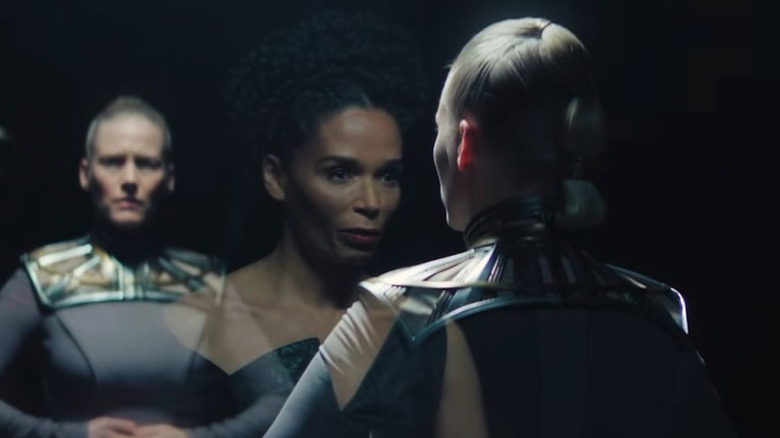The Unsettling Connection Between Apple TV's Pluribus And Foundation
"Pluribus" is a show full of curious, unexplained phenomena. It's a unique experience that marches to the beat of the human collective's drum and might not even end up following the scripted M. Night Shyamalan twists we've come to expect in sci-fi and fantasy films. However, there's one sci-fi story that "Pluribus" does echo — albeit in a much more disturbing way: "Foundation."
No, I'm not talking about the Apple TV adaptation. Not yet, anyway. So far, the timeline for "Foundation" in its first three seasons has spanned the fall of the Galactic Empire, the rise of the Foundation, and the catastrophic arrival of the hidden antagonist known as The Mule. One part of author Isaac Asimov's iconic sci-fi story that it hasn't gotten to yet, though, is an element that resonates deeply with the "Pluribus" hivemind. I'm talking about Gaia.
Gaia is, for all intents and purposes, a living planet. But if you're thinking Ego (Kurt Russell) from "Guardians of the Galaxy Vol. 2," think again. This isn't a single individual who exists as a planet. Gaia is a shared consciousness, much like the suddenly united world surrounding Carol (Rhea Seehorn) in "Pluribus."
Similarities and differences between Pluribus' hivemind and Gaia's living planet
In the later "Foundation" books, Gaia is revealed to be a planet-wide group consciousness that shares a single mind. In many ways, this lines up with what we're seeing in the early episodes of Pluribus. For instance, there are constant references to the collective "we," even when someone is interacting with a single member of Gaia. The primary representative of the planet in the story is named Bliss, and she is always using the phrase "I/we/Gaia" to speak for the entire planet.
Bliss adds that, much like the intrusive hivemind surrounding Carol in "Pluribus," Gaia doesn't value privacy. She explains that internal privacy of thought is "nothing we value at all. In fact, I/we/Gaia find it incomprehensible. To want to be not part — to have your voice unheard — your deeds unwitnessed — your thoughts unsensed —" Also like Pluribus, Gaia doesn't need to keep records because it can seamlessly remember everything spread throughout its planetary memory.
This does bring us to one of the major differences, though. The "Pluribus" hivemind appears restricted to beings of higher reasoning. (I.e., even animals aren't part of the collective.) In comparison, Gaia can incorporate flora and fauna right into its ranks. In fact, it uses the nonhuman brains of its members for things like memory banks and energy. It can even tap into plant tissue and rock. At one point in the book "Foundation and Earth," Bliss explains, "A large majority of Gaia's total memory is in its rocks."
Antagonist vs protagonist hiveminds
Membership conditions aside, the real major difference between the "Pluribus" hivemind and Gaia's living planet is the purpose of each in the story. While "Pluribus" is still unfolding as of this writing, there's no doubt that its hivemind has a deeply sinister overtone. It has led to the death of nearly a billion individuals, and even small mishaps, like Carol losing her temper, keep leading to millions of additional casualties. The loss of autonomy and unclear motivation or origin of the hivemind is also a dark, unexplained element that positions it in an antagonistic light.
In comparison, Gaia is a clearly positive force in "Foundation." It is occasionally criticized for its lack of privacy and individuality, but it never purposely plots or puts itself in a position of causing harm or willfully dominating others. Instead, it operates as a force for good, hoping to save humanity from itself and, if possible, spread from its own planet to others, where it can ideally form "Galaxia" (i.e., the living galaxy). While I won't spoil how all of that ambition goes in the upcoming greenlit season 4 of "Foundation" and beyond, let's just say the connection between Gaia and the "Pluribus" hivemind is unsettling for this very fact. Despite their overwhelming similarities, they serve very different purposes on the surface.
All of this leaves this distraught sci-fi fan seeing three possibilities unfolding: Is Gaia actually evil? Is the hivemind surrounding Carol ultimately a force for good? Or can hiveminds of this nature be good and evil in different circumstances? It's relevant food for thought, folks, especially in the AI world we live in these days.


